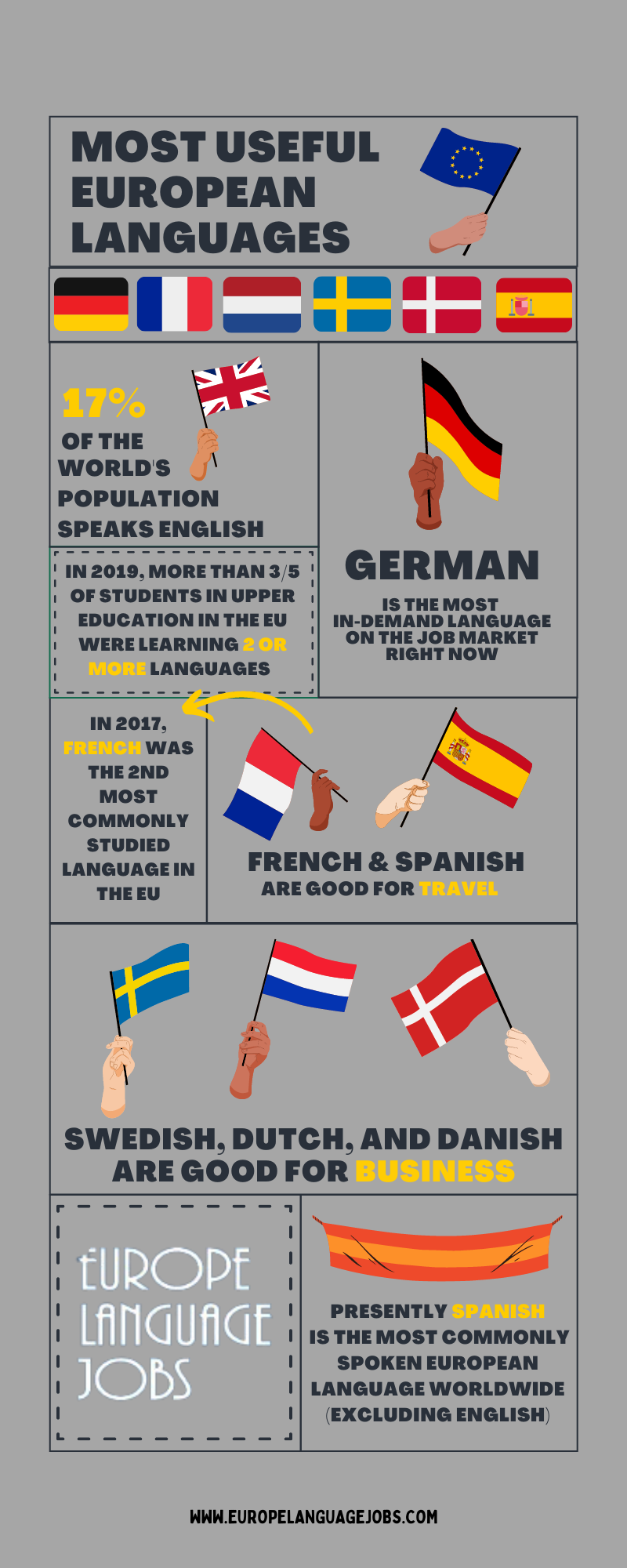We all know English continues to dominate the linguistic world. After all, this very post is written in English, although it’s not its author’s first language, and odds are it’s not yours (the reader’s), either.
It is the language we chose to communicate in worldwide, one that brings us closer. But does the fact that 1.35 billion people all over the world speak English mean that we shouldn’t learn other languages?
Well, to answer that, it’ll be helpful to know how many people there are in the world in general. The number is (approximately) 7.8 billion. Therefore, the 1.35 billion English speakers constitute a little over 17% of the world’s population. It doesn’t sound like a lot when we put it this way, does it?
I have recently visited Italy, and it was the first time in a while that I went to a country whose language I don’t speak. I felt terrible, unable to carry out a conversation as simple as asking for directions or ordering food without the other person knowing I was very obviously a tourist.
Even though I do speak four languages and Italian just doesn’t happen to be one of them, I felt like an absolute ignorant. It wasn’t a pleasant experience, so if you’re anything like me in that matter, you’ll want to learn at least one extra language.
But, in that case, a very important question appears: which one to choose? After all, there are so many!

As usual, we’ve got your back! We’re providing you today with the updated list of the most useful European languages to learn in 2025!
1. German
You have no idea about the kinds of gymnastics we have to do to provide companies in non-German-speaking countries with German-speaking candidates. We are literally bending over backwards, but our efforts don’t always bring the results we hope for.
German-speaking countries are generally known for their prosperous economical situation. Native speakers hardly want to leave their homeland of milk and honey to go work in other countries.
For this reason, employers offer lucrative benefits to attract German speakers - the salaries are usually higher than for other languages, and you can expect extras such as health insurance, meal vouchers, flexible schedules, or various financial bonuses.
So, learning to speak German at an advanced level is basically a ticket to the VIP section of the job market. Additionally, it belongs to the same linguistic group as English, so even though not identical, those two languages definitely have some similarities in terms of vocabulary and grammar. This should make learning German so much easier!
If for some reason, you’re not convinced about learning German yet, let’s move on to the next language on our list…
2. Dutch
You may be surprised to find this language as number 2 on our list, as it doesn’t usually figure on other lists of most popular languages to learn that you can find on the Internet. However, as we focus strictly on European languages and exclude those more obvious options worldwide such as Mandarin or Arabic, it turns out that Dutch is actually pretty high on the trend list.
In fact, when you investigate the language filter on our job board, you will notice that Dutch figures as number 3 in regard to the number of vacancies (excluding English). How is that possible?
Well, working with Dutch doesn’t necessarily equal working in the Netherlands, to begin with. Quite the contrary, Dutch speakers are sought-after all over Europe, most notably in countries such as Portugal, Bulgaria, the Czech Republic, and Spain.
If your main objective when choosing the most useful language to learn in 2025 is how many people speak it worldwide, you may question Dutch as it doesn’t rank high in that category. Why learn it then, you may ask?
Well, exactly for this reason.
Because Dutch is not a popular choice when it comes to learning it as a foreign language, and given the rather small size of the Dutch-speaking countries, there are not that many native speakers (23 million, to be exact).
This means that the demand for it in the job market is extremely high. There are more vacancies for Dutch speakers than actual Dutch speakers, so just like with German, companies compete with each other when it comes to offering the most attractive benefits to the candidates.
Languages such as French and Spanish are very popular all over the world, but because of the big number of speakers, the competition is also quite big. Speaking Dutch gives you the freedom that other languages don’t - of choosing the position you want, rather than letting a position choose you.

3. French
Although - admittedly - a bit cliché (pardon my French), French had to figure among the top European languages to learn in 2025. It can’t be denied that the demand for it in the job market remains high, probably due to the considerable number of countries all over the world where French is the official language.
In 2017, it was the 2nd most commonly studied language in the EU in general. And in the UK, where English is spoken natively and therefore not taught as a foreign language, it has consequently been figuring as the most popular choice for many years now.
Semantics such as French being called “the language of love” aside, it is one of the few languages where the high number of speakers worldwide coincides with a high demand in the job market.
This means that being able to speak it, you not only give yourself an edge over other candidates, but you will be able to communicate with many people wherever you go. And isn’t that the best motivation to choose it as the language to learn in 2025?

4. Swedish
Again, you might be a bit shooketh, but the proof that we don’t lie is right there, in the language filter on our job board! Go ahead and check how many offers with the Swedish language we currently have. Surprised?
If you have actually headed over to our job board, you probably noticed there are a few more Italian vacancies than Swedish. Are we gaslighting you?
The reason why Swedish made it to our list of the most useful European languages to learn in 2025 and Italian didn’t is simple.
There are between 63.4 million and 85 million Italian speakers in the world.
Do you know how many there are Swedish speakers? Approximately 10.5 million. â…™ or even â…› of Italian speakers. And over 90% of them live in Sweden (which they are most likely never going to leave).
Do you get our point now?
It’s all about the maths. Between 85 million Italian speakers worldwide and some 130 vacancies, and 10.5 million Swedish speakers (who are unlikely to leave their homeland) and 100 vacancies all over Europe, in which case are your chances of getting the job higher?
Yup, you guessed it. Learning Swedish is the way to go.
The reason why we keep emphasising the small probability of Swedish natives leaving their country for economic reasons is simple as well: lower competition. With more than 90% of them permanently rooted in Sweden, you only have to compete with the remaining 10% of Swedish speakers.
And getting a job with Swedish doesn’t necessarily require moving to the cold, unforgiving Scandinavia! At Europe Language Jobs, you can find vacancies for Swedish speakers in countries such as Portugal, Spain, Greece, and Malta - all of them with a climate much more attractive than that in the far North of Europe.
What’s more, work-from-home positions with Swedish are quite abundant, so you may not even have to move at all! So, as you can see, although Swedish is not the easiest language, and learning it might be a hassle, it will definitely be worth it.

5. Danish
Surprised again? Another random language making it to our list? What’s going on?
No, don’t leave the page yet! As we’re not discussing the most useful European languages to learn in 2025 for travelling purposes but in terms of their attractiveness on the job market, our list may differ from what you’ve heard or read somewhere else.
There are currently 101 vacancies for Danish speakers on our job board, located in countries such as Portugal, Malta, and Ireland.
With only about 6 million people speaking Danish all over the world, the odds aren’t so bad (or at least, definitely better than 250 French-speaking positions versus the 275 million French speakers worldwide - that’s more than a million candidates for one vacancy to beat).
Danish is hard to come by in most language schools, and many don’t consider it a valuable language to learn. If your goal is communicating with as many people as possible while travelling, then it indeed might not be the right choice for you.
But if you want to get ahead in the job searching game by learning only one extra language, Danish is definitely the way to go. By joining the elite of only 6 million people who can speak this language, you’re getting a free pass to a variety of well-paid positions across a number of countries.

6. Spanish
Now, that’s more like it. We’re finally done with spreading the heresy of Dutch, Swedish, and Danish being some of the best European languages to learn in 2025. This one you’ll definitely agree with - the good ol’ ESPAÑOL.
There is no denying its popularity across the globe. With 500 million people speaking it, you can go ahead and vote it the most likely European language to give English a run for its money one day.
However, if you look on our job board, you will notice that compared to the number of Spanish speakers worldwide, there aren’t that many Spanish-speaking positions. Why?
It’s not because we discriminate against Spanish speakers (the Europe Language Jobs headquarters are located in Spain, for crying out loud). But scroll up and go over the stats regarding the number of people speaking other languages on this list.
Half a billion is A LOT compared to other numbers. Of course, we are dealing with countless variations of Spanish - most of which cannot even be considered European, coming from other continents, most predominantly South America, but we will take the liberty to generalise a bit for the purpose of this article.
Regardless of the variety of Spanish, there is an abundance of Spanish speakers in the world, which means it’s not so hard for companies to find Spanish-speaking candidates. That is not to say that we’re trying to discourage you from picking up this beautiful language. Absolutely not!
By the way, if you are looking to enhance your Spanish skills online, there are plenty of options available.
Spanish is useful, fun, and easy to learn. There is a reason why literally everyone knows at least one song in Spanish (reggaeton, anyone?), while the probability of people singing along to a Swedish song in a club that is not located in Sweden is rather low.
We don’t mean to assume that Swedish isn’t attractive - there is just something about Spanish; its melodic rhythm, its catchiness and energy, that draws language learners to it like moths to a flame. And ayyy, isn’t Spanish just as hot and captivating as an open fire?
This is quite a nice variety of important languages to choose from, isn’t it? Different linguistic groups, different levels of difficulty and popularity among language learners. To each their own!
The most important conclusion to draw from this article is the following: when choosing a language, you must determine your main goal first. Why do you want to learn it? Is it because you want to increase your employability? Or do you want to make sure you can communicate with as many people as possible, wherever you go?
In the first case, choosing a less popular, niche language like Dutch or Swedish would make you a more competitive candidate. In the latter, selecting French or Spanish - spoken in many countries by many people - would be the way to go.
Did you make your decision yet? Or maybe there is another language you think should be added to the list? We’d love to hear about your experience with the most useful European languages to learn in 2025. Share your thoughts, and happy learning!
Feeling inspired? Visit our blog for more career advice! How can you be sure the information we provide is top-notch? We are a group of professionals working with recruiters, career coaches, and HR specialists from all over the world!
Trust our experience and let us help you find a new job in Europe!



























































Misha Shafi1y ago
Someone come to Portugal must learn Portuguese. It's really important to know the language.
Someone come to Portugal must learn Portuguese. It's really important to know the language.